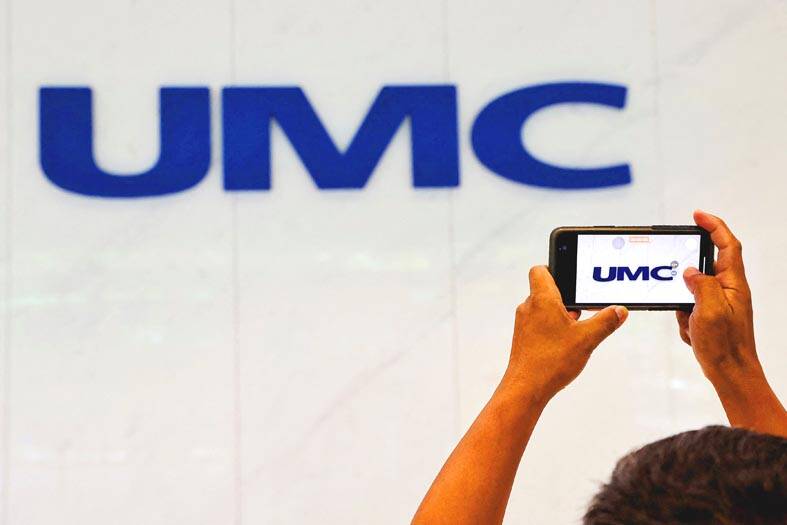United Microelectronics Corp (UMC, 聯電) yesterday said that it has no immediate plans to set up a production site in the US amid speculation that the Taiwanese company might come under pressure to invest in the US market.
The comments came after the Chinese-language Mirror Media reported earlier yesterday that with US president-elect Donald Trump set to return to the White House next month, there might be more pressure on UMC, Taiwan’s second-largest contract chipmaker, to invest in the US.
The report cited unnamed industrial sources who said the pressure could arise because the US is the largest semiconductor market in the world and also due to Trump’s tariff threats.

Photo: Ann Wang, Reuters
The report also cited an American Institute in Taiwan (AIT) Facebook post on Nov. 21 that said AIT Director Raymond Greene had visited UMC.
However, UMC said Greene was making a scheduled visit to the company and did not expand on any details.
UMC said that it has no plans to invest in the US at the moment.
It said it was focusing its resources on its ongoing project with US chipmaker Intel Corp.
In January, UMC and Intel announced that they would develop a 12-nanometer semiconductor process platform.
Production at Intel’s Ocotillo Technology Fabrication site in Arizona is set to begin in 2027.
The AIT said in its Facebook post that Greene met with UMC’s top leadership to discuss the company’s future growth strategies and to exchange views on key industry topics.
The AIT described the Taiwanese chipmaker as “a global leader in mature-node foundry services, which are essential for manufacturing the chips that power our mobile devices, connected cars, industrial equipment and” Internet of Things.
The institute said it recognizes Taiwan’s crucial role in the global semiconductor supply chain and would carry on working to ensure that global supply chains stay secure and resilient.
Taiwan Semiconductor Manufacturing Co (TSMC, 台積電), the world’s largest contract chipmaker, is investing US$65 billion in Arizona.
TSMC, which dominates the global high-end chip market, is building two advanced wafer fabs and planning another.
According to Taipei-based market information advisory firm TrendForce Corp (集邦科技), UMC was the fourth-largest company in the global pure-play wafer foundry market in the third quarter of this year, following TSMC, South Korea’s Samsung Electronics Co and China’s Semiconductor Manufacturing International Corp (中芯).

The number of Taiwanese working in the US rose to a record high of 137,000 last year, driven largely by Taiwan Semiconductor Manufacturing Co’s (TSMC, 台積電) rapid overseas expansion, according to government data released yesterday. A total of 666,000 Taiwanese nationals were employed abroad last year, an increase of 45,000 from 2023 and the highest level since the COVID-19 pandemic, data from the Directorate-General of Budget, Accounting and Statistics (DGBAS) showed. Overseas employment had steadily increased between 2009 and 2019, peaking at 739,000, before plunging to 319,000 in 2021 amid US-China trade tensions, global supply chain shifts, reshoring by Taiwanese companies and

Shiina Ito has had fewer Chinese customers at her Tokyo jewelry shop since Beijing issued a travel warning in the wake of a diplomatic spat, but she said she was not concerned. A souring of Tokyo-Beijing relations this month, following remarks by Japanese Prime Minister Sanae Takaichi about Taiwan, has fueled concerns about the impact on the ritzy boutiques, noodle joints and hotels where holidaymakers spend their cash. However, businesses in Tokyo largely shrugged off any anxiety. “Since there are fewer Chinese customers, it’s become a bit easier for Japanese shoppers to visit, so our sales haven’t really dropped,” Ito

Taiwan Semiconductor Manufacturing Co (TSMC, 台積電) received about NT$147 billion (US$4.71 billion) in subsidies from the US, Japanese, German and Chinese governments over the past two years for its global expansion. Financial data compiled by the world’s largest contract chipmaker showed the company secured NT$4.77 billion in subsidies from the governments in the third quarter, bringing the total for the first three quarters of the year to about NT$71.9 billion. Along with the NT$75.16 billion in financial aid TSMC received last year, the chipmaker obtained NT$147 billion in subsidies in almost two years, the data showed. The subsidies received by its subsidiaries —

OUTLOOK: Pat Gelsinger said he did not expect the heavy AI infrastructure investments by the major cloud service providers to cause an AI bubble to burst soon Building a resilient energy supply chain is crucial for Taiwan to develop artificial intelligence (AI) technology and grow its economy, former Intel Corp chief executive officer Pat Gelsinger said yesterday. Gelsinger, now a general partner at the US venture capital firm Playground Global LLC, was asked at a news conference in Taipei about his views on Taiwan’s hardware development and growing concern over an AI bubble. “Today, the greatest issue in Taiwan isn’t even in the software or in architecture. It is energy,” Gelsinger said. “You are not in the position to have a resilient energy supply chain, and that,